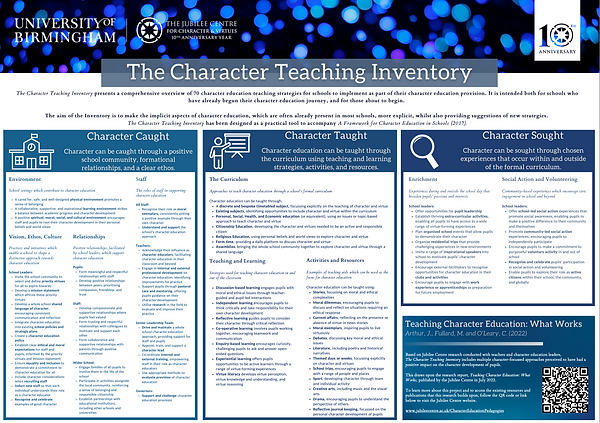
School Building

Ofsted Grading Logo


School Building
Module 5: Character Education
Introduction to (Year 2) Module 5:
This module consists of 6 weeks of learning:
Week 1: Introducing Character Education
Week 2: Embedding Character Education in the Classroom
Week 3: Reflecting on your Personal Values and Virtues.
Weeks 4 -6: Developing and Applying Character Education in the Classroom
The Learn that... and Learn how to statements covered within this module are captured on the ECF Induction Programme mapping document.
Week 1: Introducing Character Education
This week we will consider what character education is and why it is important. We will explore the government and The Jubilee Centre for Character and Virtues' frameworks linked to character education.
Teachers' Standards:

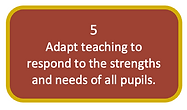
Evidence and Research:
The Jubilee Centre for Character and Virtues is based within The University of Birmingham and specialist in character education. They define character as:
"a set of personal traits or dispositions that produce specific moral emotions, inform motivation, and guide conduct".
(Jubilee Centre for Character and Virtues, n.d)
They define character education as inclusing:
"all the explicit and implicit educational activities that help young people to develop positive personal strengths called virtues'
(Jubilee Centre for Character and Virtues, 2022)
The Jubilee Centre (n.d) go on to suggest that virtues such as honesty, self-control, respect that contribute to having 'good character' can be part of the solution to the challenges faced by society. They go on to argue that everyone should have the opportunity to develop 'good character' and give the following reasons for this:

Take some time to read through the Jubilee Centre for Character and Virtues' Framework for Character Education in Schools. This framework can serve as a basis for schools to develop character education within and across their curriculum - focus in on the idea of character being 'caught', 'taught' and 'sought'.
The Building Blocks of Character is a useful diagram that captures the 4 categories of virtues and how these support the development of practical wisdom thus leading to flourishing individuals and society. It is important to note that the virtues used within the diagram as examples are not a definitive list, and are just that, examples but are a good place to start when consider which character virtues you wish to focus on within your own classroom or even as a school - as you cannot focus on every virtue! You will undertake an activity to consider your own values (virtues) in Week 3.

(Jubilee Centre for Character and Virtues, 2022)
The DfE (2029) has also produced a guidance framework related to character education - there are overlaps between this and that of The Jubilee Centre but also differences. It is worth taking a look at the DfE document to enable you to see alternative angles and approaches - it is also useful with regards to evaluation.
Reflection and Discussion
Take some time to reflect on your learning within this week using Greenway's (1992) Four Fs Model:

Use this as follows:
Facts: What are the key points you have learned?
Feelings: What do you feel about character education? How do you feel this will support you, as a teacher and your students?
Findings: Why is character education important? How might this impact your practice? What are the key elements of character education?
Future: How might you imagine using what you have learned? What choices do you have? What ideas do you have for embedding character education in your teaching?
References
DfE (2019) Character Education Framework Guidance. Available at: https://assets.publishing.service.gov.uk/media/5f20087fe90e07456b18abfc/Character_Education_Framework_Guidance.pdf
Jubilee Centre for Character and Virtues (no date) What is Character Education? Available at: https://www.jubileecentre.ac.uk/about/what-is-character-education/
Jubilee Centre for Character and Virtues (2022) The Jubilee Centre Framework for Character Education in Schools 3rd Ed. Available at:https://www.jubileecentre.ac.uk/wp-content/uploads/2024/12/The-Jubilee-Centre-Framework-for-Character-Education-in-Schools.pdf
The University of Edinburgh (no date) The Four Fs of Active Reviewing. Available at: https://reflection.ed.ac.uk/reflectors-toolkit/reflecting-on-experience/four-f
Week 2: Embedding Character Education in the Classroom
This week we will focus on learning how you can embed character education within your own classroom and teaching as well as across the school.
Teachers' Standards:


Evidence and Research:
Watch this webinar by Professor Andrew Peterson that explores embedding character education in the curriculum. Andrew is Professor of Character and Citizenship Education at The University of Birmingham.
You can access resources and further information that Andrew refers to here
Access the free chapter from the book below. There is also a copy of the book in the staff library in the staffroom.
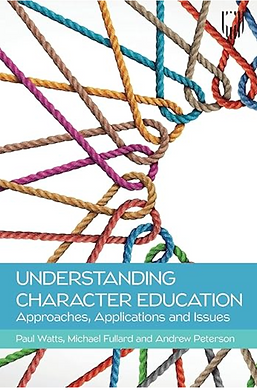
The Character Teaching Inventory may be a useful document to support you in developing character education. This again was developed by The Jubilee Centre for Character and Virtues.
Click on the image below to download and take a look at this document.
Reflection and Discussion
Now take a moment to reflect upon your learning from week 2.
What new key knowledge and understanding have you developed this week?
How does this link to your learning from week 1?
How might you begin to consolidate this knowledge to apply this to practice?
What further knowledge do you need?
What are the actions you want or need to take next?
What further support do you need? Who might offer this?
References
Bowden Education (no date) Embedding Character Education in the Curriculum - Webinar with Professor Andrew Peterson.
Jubilee Centre for Character and Virtues (no date) The Character Teaching Inventory.
Watts, P., Fullard, M. and Peterson, A. (2021) Understanding Character Education: Approaches, Applications and Issues. Maidenhead. Open University Press.
Week 3: Reflecting on your personal values and virtues
This week you will reflect upon your own values and virtues producing your own professional values document.
Teachers' Standards:
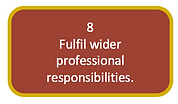
Reflection and Discussion
Watch the video below and undertake the activity that scaffolds you to reflect upon and identity your core professional values.
The list of values can be accessed by clicking on the mage under the video. You will want to print this off ahead of watching the video and undertaking the activity.
You may also wish to refer back to the Building Blocks of Character and add any values (virtues) that appear there should you wish.

Taking your 5-7 core professional values, you will refine these into your own professional values document - this document will assist you in firstly, exploring how these values are lived within your practice and secondly acts as a useful evaluation tool to assess how virtuous you are.
Take a moment to watch and work through the video below.
The values document referred to in the video can be access below it and my be used as a scaffold for your own values document.
Take this document to your weekly mentor meeting to discuss.
This example may help scaffold your document:
References
Brown, B. (no date) Dare to Lead List of Values. Available at: https://brenebrown.com/resources/dare-to-lead-list-of-values/
Jubilee Centre for Character and Virtues (2022) The Jubilee Centre Framework for Character Education in Schools 3rd Ed. Available at:https://www.jubileecentre.ac.uk/wp-content/uploads/2024/12/The-Jubilee-Centre-Framework-for-Character-Education-in-Schools.pdf
Week 4: Developing and applying character education in the classroom
This week you will begin to apply your learning related to character education to your teaching practice with a focus on character that is caught and by employing the improvement cycle approach as you have done previously.
Teachers' Standards:
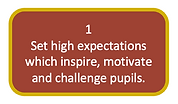

Application and Exploration of Practice and Setting:
You may/will want to access these resources to support you over the next three weeks (as you did in the previous modules) The resources for this are below should you need to refer to them:
This time you will use the implementation cycle within each week rather than across the weeks.

Your stimulus is to develop and embed ways that character can be 'caught' within your professional practice.

Using the inventory that we explored previously to support your thinking and your own professional values document, take some time to consider how you will support the notion of character being 'caught' within your professional practice.
Consider how you will demonstrate and live your own values and be virtuous in your professional practice.
Refer back to your professional values document to consider what this would look like.
You may wish to choose 2 or 3 professional values to focus on this week.



Work on embedding these chosen values into every aspect of your professional practice- consider behaviour, language and practice.
Observe colleagues in meetings, around the school and within their lessons.
What values are they living?
Are there any that align with your? Are these lived differently?
What have you learnt from observing the enactment of virtues?
Reflection and Discussion

Evaluate how your practiced your values at the end of each day - thinking about how you demonstrated virtues, consider the evidence you have of this, how this impacted others, where there were virtue dilemmas and how you managed these and where you fell short and what you will do better next time.
Also reflect upon the impact that living these chosen virtues has had upon students and colleagues alike.
Invite your mentor to comment and feedback on these virtues during your weekly mentor meeting - how do they see you living these and when? Are there instances where you do not?

Based upon your observations, your evaluations and the feedback from your mentor, how do you live your values? What impact does this have? How might you develop this further?
Are there any actions you need to take?
You may want to consider focusing on another pair of values another week.
Week 5: Developing and applying character education in the classroom
This week you will begin to apply your learning related to character education to your teaching practice with a focus on character that is taught and through employing the improvement cycle approach as you have done previously.
Teachers' Standards:



Application and Exploration of Practice and Setting:

Your stimulus is to develop and embed ways that character can be 'taught' within your professional practice.

So far you have focused on your values. Take a moment to consider the values that you feel are important within your classroom, ensuring these align or overlap with the school's values.
You may wish to go back to Brene Brown's list of values or the Building Blocks for Character Education to help you identify the values that you wish to teach within your class.
From this list (again of between 5 and 7 values) choose a virtue to focus on teaching for this week.
Think about how you can embed this teaching throughout the curriculum. The inventory will offer some ideas.


Put your ideas and plans into practice across the week.

Observe a colleague or colleagues teach this week. Consider how they are teaching your chosen virtues in their lesson.
What can you learn from this and develop in your own practice?
Where there any missed opportunities?

Your mentor will observe you this week with a focus on how you have embedded your chosen virtue into your teaching.
They will discuss this with you in your weekly mentor meeting.
Reflection and Discussion

Consider the observation comments, your own self-reflection and what you have learnt from the observations you have undertaken.
How can you further develop the teaching of this virtue across the curriculum?
How might you begin to embed the teaching of the other virtues you decided upon for your class?
What worked well?
What did no work so well? For what reasons?
What else might you try?
Week 6: Developing and applying character education in the classroom
This week you will begin to apply your learning related to character education to your teaching practice with a focus on character that is sought and through employing the improvement cycle approach as you have done previously.
Teachers' Standards:

Application and Exploration of Practice and Setting:

Your stimulus is to develop and embed ways that character can be 'sought' within your professional practice.

Using the list of virtues you identified as a focus for your class.
How might character be sought?
Use the inventory below to scaffold your ideas.


There may be enrichment that the students are already engaged in that will support the development of these virtues. Are there other activities you think would support them to develop these virtues?
What might you introduce to support the development of these virtues?
You may have to consider each student individually and it may be helpful to create a grid with the students' names and then the list of virtues completing adding in for each how these are sought by each individual student.

Take some time to explore the activities the students are engaged with outside of school.
How might these support the development of these virtues?
You may want to note these on the grid you have developed in the practice and embed stage.
Reflection and Discussion


The two stages of monitor and review can be looked at simultaneously.
Here, reflect upon how enrichment and activities beyond the formal curriculum can support the development of character through character being sought.
How important are these activities in supporting character education?
How might decisions around types of enrichment align with the development of identified virtues?
Can enrichment and other such activities support the bringing to life of the school values?
How can character education link to the development of emotional honesty, 21st Century skills and the use of coaching approaches? Is there synergy?



